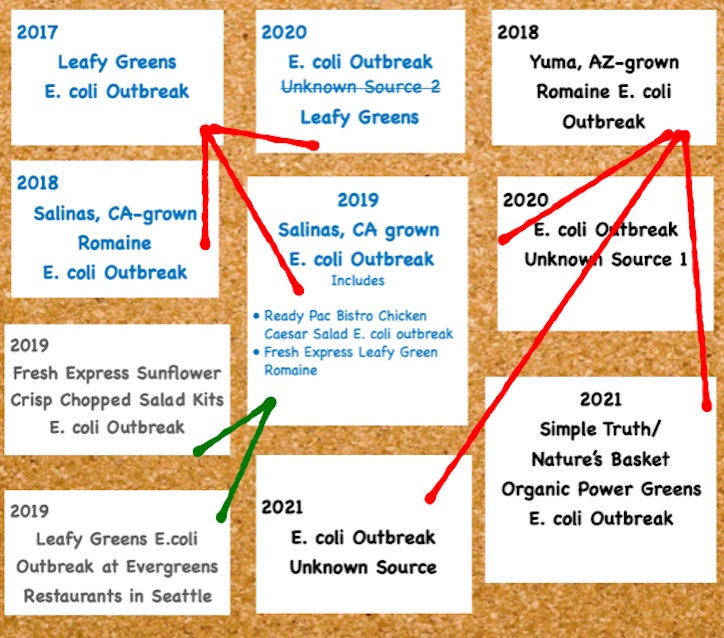This week, the CDC announced the end of a deadly leafy greens E. coli outbreak. And revealed that it was caused by the same strain as the deadly outbreak linked to romaine lettuce grown in Yuma, AZ in 2018.
This is the fourth multistate outbreak linked to this E. coli O157:H7 strain since 2018. All of them have included at least one fatality. Two of them occurred in 2021.
Together these four outbreaks resulted in 274 illnesses, 126 hospitalizations, 33 cases of a type of kidney failure called hemolytic uremic syndrome (HUS), and eight deaths. Leafy greens were identified as the source of two of the outbreaks. For the other two, which occurred in 2020 and 2021, the source was declared as “unknown.”
Like the 2018 outbreak, some of the greens linked to the outbreak that ended this week were grown in Yuma. And some came from Salinas, CA. A different E. coli strain from that growing area has also been linked to at least four multistate outbreaks. (See graphic below.)

Outbreaks in the blue text were caused by the same strain. Outbreaks in the black text were caused by the same strain. Outbreaks linked by green lines were caused by the same grower.
California and Arizona produce about 95 percent of lettuce grown in the U.S., dividing the year seasonally. In both states, some of the farms are located near ranches where cattle graze or near concentrated animal feeding operations (CAFOs). This is problematic as cattle are the primary reservoir for E. coli O157:H7, which causes severe illness and death in humans.
The 2018 Yuma-grown romaine lettuce outbreak is the deadliest U.S. E. coli outbreak in recent history. The 36-state outbreak, which began in March 2018 sickened 210 people. Ninety-six people were hospitalized, 27 with HUS. Five people died. Investigators found the outbreak strain in water samples taken from an irrigation canal near that was also near a CAFO capable of holding 100,000 head of cattle at a time.
Simple Truth and Nature’s Basket Organic Power Greens E. coli Outbreak
The E. coli outbreak that ended this week was linked to a packaged salad mix of “organic power greens” sold under the brand names Simple Truth and Nature’s Basket. Both brands contain the same mixture of leafy greens: organic spinach, mizuna, kale, and chard.
Nature’s Basket is a Giant Eagle store brand. Simple Truth is a Kroger brand. The Kroger family of stores includes Baker’s, City Market, Dillons, Food 4 Less, Foods Co, Fred Meyer, Fry’s, Gerbes, Jay C, Food Store, King Soopers, Kroger, Mariano’s, Metro Market, Pay-Less Super Markets, Pick’n Save, QFC, Ralphs and Rule.
It’s not clear which of those stores carried the leafy greens in question as no recall was issued for the products. When the outbreak was announced on December 30, 2021, the U.S. Food and Drug Administration (FDA) said none of the implicated salads were likely to still be on the market.
The outbreak ended with 10 illnesses, two cases of HUS, and one death, according to the CDC. (The FDA’s final report on the outbreak which was published in advance of the CDC’s did not include the fatality or the second case of HUS.) The number of illnesses reported from each state was: Alaska (2), Ohio (1), Oregon (1), and Washington (6). The death was reported in Washington.
Health officials interviewed the outbreak patients about the foods they ate before they became ill. Nine of them said they ate prepackaged organic power greens in the week before they got sick. Eight of them specifically mentioned Simple Truth brand power greens. One of them cited Nature’s Basket brand. Shopper records show the purchase of these products.
Using a DNA fingerprinting method called whole genome sequencing, health officials identified the genetic “fingerprint” of the E. coli outbreak strain. Results of these tests showed that the fingerprints for all of the patients are closely related, suggesting they all got sick from the same food. This testing process also revealed that the outbreak strain was the same as the deadly 2018 Yuma romaine outbreak and two other fatal outbreaks with unknown sources.
Leafy greens are considered the second-most common source of E. coli O157:H7 outbreaks. But they may soon knock ground beef from the top spot. Between 2009 and 2018, 40 E. coli outbreaks were linked to leafy greens, according to a study published in the CDC journal Emerging Infectious Disease, called Lessons Learned from a Decade of Investigations of Shiga Toxin–Producing Escherichia coli Outbreaks Linked to Leafy Greens, United States and Canada.





